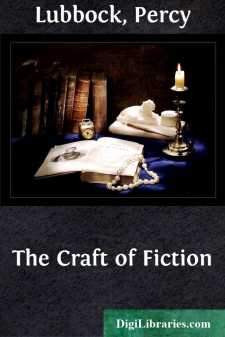Categories
- Antiques & Collectibles 13
- Architecture 36
- Art 48
- Bibles 22
- Biography & Autobiography 813
- Body, Mind & Spirit 142
- Business & Economics 28
- Children's Books 14
- Children's Fiction 11
- Computers 4
- Cooking 94
- Crafts & Hobbies 4
- Drama 346
- Education 46
- Family & Relationships 57
- Fiction 11828
- Games 19
- Gardening 17
- Health & Fitness 34
- History 1377
- House & Home 1
- Humor 147
- Juvenile Fiction 1873
- Juvenile Nonfiction 202
- Language Arts & Disciplines 88
- Law 16
- Literary Collections 686
- Literary Criticism 179
- Mathematics 13
- Medical 41
- Music 40
- Nature 179
- Non-Classifiable 1768
- Performing Arts 7
- Periodicals 1453
- Philosophy 64
- Photography 2
- Poetry 896
- Political Science 203
- Psychology 42
- Reference 154
- Religion 513
- Science 126
- Self-Help 84
- Social Science 81
- Sports & Recreation 34
- Study Aids 3
- Technology & Engineering 59
- Transportation 23
- Travel 463
- True Crime 29
The Craft of Fiction
by: Percy Lubbock
Categories:
Description:
Excerpt
THE CRAFT OF FICTION
To grasp the shadowy and fantasmal form of a book, to hold it fast, to turn it over and survey it at leisure—that is the effort of a critic of books, and it is perpetually defeated. Nothing, no power, will keep a book steady and motionless before us, so that we may have time to examine its shape and design. As quickly as we read, it melts and shifts in the memory; even at the moment when the last page is turned, a great part of the book, its finer detail, is already vague and doubtful. A little later, after a few days or months, how much is really left of it? A cluster of impressions, some clear points emerging from a mist of uncertainty, this is all we can hope to possess, generally speaking, in the name of a book. The experience of reading it has left something behind, and these relics we call by the book's name; but how can they be considered to give us the material for judging and appraising the book? Nobody would venture to criticize a building, a statue, a picture, with nothing before him but the memory of a single glimpse caught in passing; yet the critic of literature, on the whole, has to found his opinion upon little more. Sometimes it is possible to return to the book and renew the impression; to a few books we may come back again and again, till they do in the end become familiar sights. But of the hundreds and hundreds of books that a critic would wish to range in his memory, in order to scrutinize and compare them reflectively, how many can he expect to bring into a state of reasonable stability? Few indeed, at the best; as for the others, he must be content with the shapeless, incoherent visions that respond when the recollection of them is invoked.
It is scarcely to be wondered at if criticism is not very precise, not very exact in the use of its terms, when it has to work at such a disadvantage. Since we can never speak of a book with our eye on the object, never handle a book—the real book, which is to the volume as the symphony to the score—our phrases find nothing to check them, immediately and unmistakably, while they are formed. Of a novel, for instance, that I seem to know well, that I recall as an old acquaintance, I may confidently begin to express an opinion; but when, having expressed it, I would glance at the book once more, to be satisfied that my judgement fits it, I can only turn to the image, such as it is, that remains in a deceiving memory. The volume lies before me, no doubt, and if it is merely a question of detail, a name or a scene, I can find the page and verify my sentence. But I cannot catch a momentary sight of the book, the book itself; I cannot look up from my writing and sharpen my impression with a straight, unhampered view of the author's work; to glance at a book, though the phrase is so often in our mouths, is in fact an impossibility. The form of a novel—and how often a critic uses that expression too—is something that none of us, perhaps, has ever really contemplated. It is revealed little by little, page by page, and it is withdrawn as fast as it is revealed; as a whole, complete and perfect, it could only exist in a more tenacious memory than most of us have to rely on....



